stocks and stones: idols made of wood or rock; cf. Jeremiah 2:26-27: "As the thief is ashamed when he is found, so is the house of Israel ashamed; they, their kings, their princes, and their priests, and their prophets, | Saying to a stock, Thou art my father; and to a stone, Thou hast brought me forth: for they have turned their back unto me, and not their face: but in time of their trouble they will say, Arise, and save us." See also Wisdom of Solomon 14:21: "And this was an occasion to deceive the world: for men, serving either calamity or tyranny, did ascribe unto stones and stocks the incommunicable name"; and Milton, Sonnet 18, "On the Late Massacre in Piedmont": "When all our fathers worshipped stocks and stones" (4).
